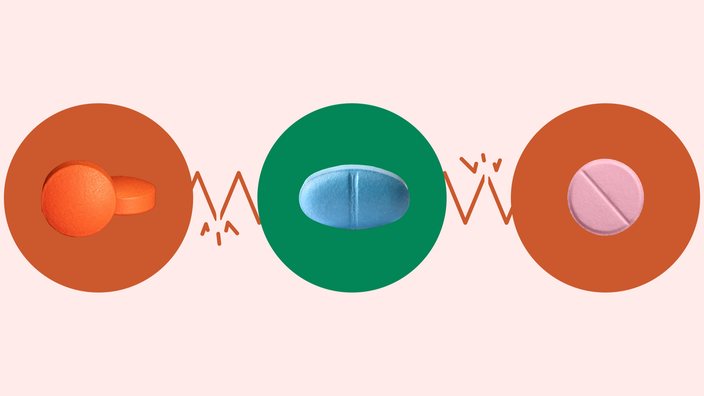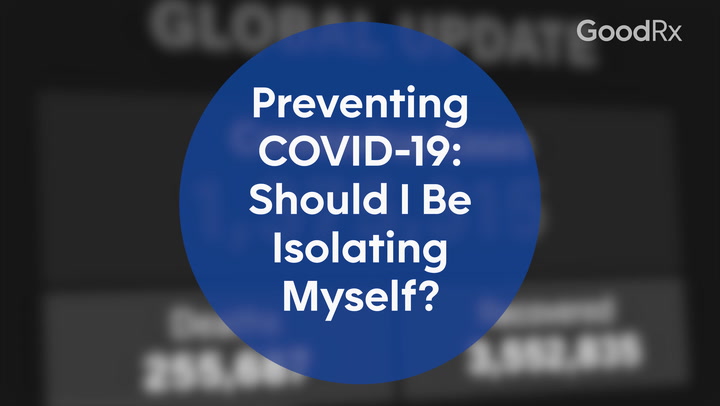
7 Naproxen Interactions to Watch Out for
Key takeaways:
Naproxen (Aleve, Naprosyn) is a nonsteroidal anti-inflammatory drug (NSAID). It interacts with other NSAIDs, blood thinners, and some antidepressants. The risk of stomach-related side effects and unwanted bleeding goes up if you take naproxen with these medications.
If you take blood pressure medications, naproxen may make them less effective or raise the risk of kidney problems if they’re combined.
Naproxen can also raise lithium and methotrexate levels in the body. If your prescriber OKs taking naproxen with either of these medications, you’ll likely need extra monitoring to protect your safety.
Access savings on related medications
Table of contents

We all know that life comes with its share of aches and pains. Overdid it at the gym? Or maybe you tweaked your back getting off the couch? Chances are, you’ll look to an over-the-counter (OTC) pain reliever for relief.
Naproxen (Aleve, Naprosyn) is a common OTC option for minor aches and pains. But before you take it, there’s something you should consider: drug interactions. Drug interactions can raise your risk of side effects or change how well a medication works. So it’s important to know what to watch out for. Here, we’ll review common naproxen interactions to be aware of.
Naproxen interactions at a glance
Below is a general list of naproxen interactions for reference. Keep in mind that this isn’t a list of all possible interactions. So it’s best to review your medication list with a healthcare professional before you take naproxen to make sure it’s a safe option for you.
Naproxen interactions:
Blood thinner medications (anticoagulants and antiplatelet drugs)
Other nonsteroidal anti-inflammatory drugs (NSAIDs)
Low-dose aspirin
Diuretics (‘water pills’)
Digoxin (Lanoxin)
Lithium (Lithobid)
Methotrexate (Trexall, Otrexup)
Cyclosporine (Sandimmune)
Pemetrexed (Altima, Pemfexy, others)
Sucralfate (Carafate)
Probenecid
Let’s take a more detailed look at seven common naproxen interactions and their risks.
1. Nonsteroidal anti-inflammatory drugs
Naproxen is an NSAID. So it makes sense that you shouldn’t take other NSAIDs and naproxen at the same time. This includes common OTC medications such as aspirin and ibuprofen (Advil, Motrin).
NSAIDs can be tough on the lining of the stomach and intestines (the gastrointestinal, or GI, tract). Taking more than one NSAID puts you at a higher risk for GI side effects. These include stomach ulcers and bleeding.
But it’s not just pain relievers that you should pay attention to. Naproxen and other NSAIDs are often included in combination OTC products, such as cold medications, pills for menstrual cramps, and even some antacids.
Mixing medications: Is it safe to take acetaminophen (Tylenol) with ibuprofen (Advil, Motrin) for added pain relief? Here’s what pharmacists recommend about mixing over-the-counter pain meds.
Non-medication treatment options for pain: Check out ways to find pain relief that don’t involve medications.
Who shouldn’t take NSAIDs? Naproxen and other NSAIDs aren’t the best choice for everyone. Find out who should avoid NSAIDs and why.
Always check the list of ingredients on OTC products to see what medications are included. And ask your pharmacist for recommendations on what’s safe to take with naproxen.
Can you take naproxen and ibuprofen together?
No. Naproxen and ibuprofen are both NSAIDs. As mentioned, taking them together can increase your risk of stomach problems, including bleeding. If you need additional pain relief before your next naproxen dose, acetaminophen (Tylenol) may be a safer option.
If naproxen isn’t working for your symptoms and you want to switch to ibuprofen, you’ll need to wait 8 to 12 hours after your last naproxen dose to make the switch.
2. Low-dose aspirin
Taking low-dose aspirin for heart health? Check with your prescriber before combining it with naproxen. They may give you the green light to take both. But there’s still an interaction to be aware of that’s unique to low-dose aspirin. Naproxen can make low-dose aspirin’s benefits less effective if they’re taken at the same time.
Aspirin and naproxen both have antiplatelet effects. This makes your blood platelets less likely to stick together and form clots. If you take both medications at the same time, naproxen can block the antiplatelet properties of aspirin. This could make aspirin less effective at preventing blood clots that cause heart attacks or strokes.
To make sure you’re still getting the full benefit from your low-dose aspirin, take naproxen at least 2 hours before or after your aspirin dose. Keep in mind this strategy only works if you take naproxen occasionally. If you need to take naproxen regularly, it’s best to discuss the combination with your healthcare team.
3. Blood thinners
Antithrombotics (“blood thinners”) are medications used to help treat or prevent blood clots. They include anticoagulants and antiplatelet medications.
Anticoagulants, such as warfarin (Coumadin, Jantoven) and apixaban (Eliquis), slow down how fast your blood clots. Antiplatelet medications, such as clopidogrel (Plavix) and ticagrelor (Brilinta), keep your platelets from sticking together to form clots.
As mentioned above, naproxen has antiplatelet properties. So taking it with blood thinners raises your risk of having a serious bleed. This risk goes up even if you only take a few doses of naproxen. This is especially true if you’re taking a blood thinner after having a heart attack.
If you’re taking an antithrombotic, ask your prescriber about safer pain relief options. Naproxen and other NSAIDs are typically avoided in this situation.
4. Blood pressure medications
There are a few reasons to talk to your prescriber before combining naproxen with blood pressure medications.
Naproxen can raise your blood pressure and make it harder for blood pressure medications to do their job. This can make it harder to keep your blood pressure within a healthy range, especially if you take naproxen often.
Combining naproxen with certain types of blood pressure medications might also put your kidneys at risk. One side effect of naproxen is that it can temporarily lower your kidney function. Some blood pressure medicines also affect the kidneys. And kidney injury is more likely if you take them along with naproxen.
Blood pressure medications to watch out for are:
ACE inhibitors, such as lisinopril (Zestril) and ramipril (Altace)
Diuretics (“water pills”), such as furosemide (Lasix) and hydrochlorothiazide (Microzide)
The risk for kidney damage from naproxen might be even higher if you’re taking more than one of these blood pressure medications. For example, a diuretic and an ACE inhibitor. Ask your prescriber if a pain reliever that doesn’t involve the kidneys, such as acetaminophen (Tylenol), might be a safer choice.
5. SSRI antidepressants
SSRIs are a commonly prescribed group of antidepressants. Examples include sertraline (Zoloft) and fluoxetine (Prozac).
Both SSRIs and naproxen have risks for stomach-related side effects, such as nausea and diarrhea. And when they’re taken together, the risk of developing stomach ulcers is higher than with either medication alone.
SSRIs and naproxen also both raise the risk of bleeding. So taking them together can also increase the risk of this side effect.
If you need to take both naproxen and an SSRI, your prescriber may suggest an additional medication to protect your stomach. They’ll likely also have you keep an eye out for signs of bleeding. Let them know if you notice minor bleeding, such as when you’re brushing your teeth. But seek emergency care if there’s blood in your urine or stool or you’re vomiting or coughing up blood.
6. Lithium
Lithium is commonly prescribed for people living with bipolar disorder. While effective, it has a number of interactions that can be dangerous.
Lithium is removed from the body through the kidneys. But naproxen can lower your kidney function. This combination can cause lithium levels in your blood to become too high. High lithium levels can lead to serious side effects, such as confusion, vomiting, and slurred speech.
Talk to your prescriber before taking naproxen or other NSAIDs with lithium. If they OK the combination, you may need additional blood tests to monitor your kidney health and lithium levels to help protect your safety.
7. Methotrexate
Methotrexate is a common treatment for autoimmune disorders, such as rheumatoid arthritis (RA). Naproxen and other NSAIDs are often a recommended treatment for RA, too. But this combination should be discussed with your prescriber first.
Naproxen can increase methotrexate levels in your blood. This is especially the case if you take it on the same day as your methotrexate dose. High levels of methotrexate can lead to organ damage and blood problems, such as a low platelet count.
Ask your prescriber before taking naproxen with methotrexate. They might give you the OK for combining low-dose methotrexate with naproxen. But, don’t be surprised if they ask you to come in for more frequent blood tests. This can help make sure your methotrexate levels are staying within a safe range.
How can I avoid or manage potential interactions with naproxen?
Certain risk factors may raise the risk of naproxen interactions and complications. Talk to your healthcare team if you have kidney problems, are over 65 years old, or have a history of stomach ulcers. It’s also a good idea to check with your prescriber before taking naproxen if you’ve ever had a heart attack or if you have heart failure.
Your healthcare team may decide that naproxen is still the best choice for you even if there’s a possibility for an interaction. In that case, they may recommend more monitoring or taking an additional medication to help protect your GI tract.
It’s also important to always take naproxen as directed. You should use the lowest effective dose for the shortest amount of time possible. It’s also best to take it with food to help prevent stomach upset and stay hydrated to help protect your kidneys.
Frequently asked questions
Yes, naproxen doesn’t interact with antibiotics. It’s fine to take it if you’re having pain or a fever along with an infection. Just keep in mind that antibiotics can often be hard on your stomach. So be sure to take naproxen with food to help reduce further irritation.
Caffeine may raise the risk of stomach-related side effects if you combine it with naproxen. This is especially true when it comes to coffee, since its acidity can further increase irritation. You may want to cut back your caffeine intake on the days you take naproxen to be on the safe side. Your healthcare team can provide further guidance based on your medical history.
The bottom line
Naproxen (Aleve, Naprosyn) interactions include other nonsteroidal anti-inflammatory drugs (NSAIDs), selective serotonin reuptake inhibitors (SSRIs), and blood thinners. Combining naproxen with these medications can raise the risk of stomach-related side effects and make unwanted bleeding more likely.
Naproxen may make blood pressure medications less effective or raise the risk of kidney problems if they’re combined. And naproxen may increase lithium (Lithobid) and methotrexate (Trexall) levels if you take it along with either medication. Ask your pharmacist or prescriber to review your medication list for interactions before taking naproxen to help protect your safety.
Why trust our experts?



References
Colebatch, A. N., et al. (2011). Non-steroidal anti-inflammatory drugs, including aspirin and paracetamol (acetaminophen) in people taking methotrexate for inflammatory arthritis. Cochrane Database of Systematic Reviews.
Colebatch, A. N., et al. (2012). Safety of nonsteroidal antiinflammatory drugs and/or paracetamol in people receiving methotrexate for inflammatory arthritis: A cochrane systematic review. Journal of Rheumatology.
de Jong, J. C. F., et al. (2003). Combined use of SSRIs and NSAIDs increases the risk of gastrointestinal adverse effects. British Journal of Clinical Pharmacology.
Dixit, M., et al. (2010). Significant acute kidney injury due to non-steroidal anti-inflammatory drugs: Inpatient setting. Pharmaceuticals.
Dreischulte, T., et al. (2015). Combined use of nonsteroidal anti-inflammatory drugs with diuretics and/or renin-angiotensin system inhibitors in the community increases the risk of acute kidney injury. Kidney International.
Lapi, F., et al. (2013). Concurrent use of diuretics, angiotensin converting enzyme inhibitors, and angiotensin receptor blockers with non-steroidal anti-inflammatory drugs and risk of acute kidney injury: Nested case-control study. BMJ.
National Cancer Institute. (n.d.). Platelet. National Institutes of Health.
National Kidney Foundation. (n.d.). 6-step guide to protecting kidney health.
Olsen, A. S., et al. (2015). Association of NSAID use with risk of bleeding and cardiovascular events in patients receiving antithrombotic therapy after myocardial infarction. JAMA.
Preferred Pharmaceuticals Inc. (2025). Naproxen- naproxen tablet [package insert].
Risser, A., et al. (2009). NSAID prescribing precautions. American Family Physician.
U.S. Food and Drug Administration. (2006). Concomitant use of ibuprofen and aspirin: Potential for attenuation of the anti-plately effect of aspirin.
U.S. Food and Drug Administration. (2018). FDA Drug Safety Communication: FDA warns about serious bleeding risk with over-the-counter antacid products containing aspirin.
Was this page helpful?
Related Articles
Browse medications
View AllResearch prescriptions and over-the-counter medications from A to Z, compare drug prices, and start saving.




























